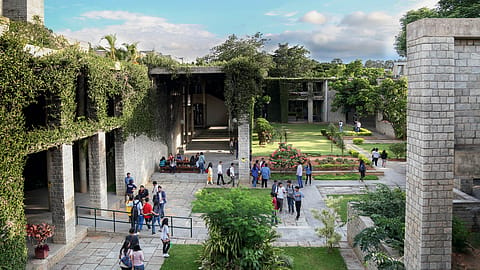IIM-B: Nurturing An Entrepreneurial Ecosystem
As tech takes centre stage, the institute gears up to face the challenge.

This story belongs to the Fortune India Magazine November 2024 issue.
IN 2023, Indian Institute of Management Bangalore (IIM-B) celebrated its golden anniversary. Established in 1973 as an autonomous management institution by the Central government, in its initial years, IIM-B’s focus was to nurture public sector enterprises. While the first batch of the two-year full-time Post Graduate Programme at IIM-B graduated in 1976, in 2009, the institute launched its Executive Post Graduate Programme, a one-year full-time master’s programme.
Through these years, IIM-B’s emphasis on technology, data and entrepreneurship has helped it carve out a niche among other B-schools in the country.
Post Covid, in 2021, the institute went through a major review of its Masters of Business Administration curriculum. With digital technology and transformation being a common theme across sectors globally and with the growing importance of data, analytics and AI, along with emphasis on Environmental, Social, and Governance (ESG), IIM-B’s new syllabus and courses are a reflection of these changes. Three years ago, the institute also introduced a separate course on digital business as a part of its core curriculum of the MBA programme. The inclusion of this course, centered around understanding of technologies and its integration into business transformations, has made a significant difference to the programme, says Rishikesha T Krishnan, director, IIM-B.
The institute also introduced a Post Graduate Programme in Business Analytics in 2020, which has caught on. While the specialised stream has 75 students, it is also available as electives to those in the general MBA programme.
ESG was the next focus area. “We had a course called Business Government and Society. We have made some modifications in that to bring in governance ethics in a much stronger way than before,” adds Krishnan. IIM-B is also bringing in a core course on sustainability, expected to be launched from next academic year.
Last year, IIM Bangalore restarted its Post graduate Programme in Public Policy and Management, a 48-week modular and hybrid PG Diploma course aimed at improving efficiency and leadership skills among policymakers and administrators. The Massive Online Open Courses (MOOC) offered by the institute are seeing a high enrollment, especially through SWAYAM — a Government of India digital learning initiative started in 2014 in partnership with edX — a not for profit online initiative of Harvard and MIT. Today, MOOC offers nearly 50 courses on its platform.
The recently introduced Bachelor of Business Administration in Digital Business and Entrepreneurship is a three-year degree offered online that can be completed within six academic years from the date of joining. Examinations are held at different centres across India. More than 1,000 students have already enrolled in the programme. There are other plans as well. “While there have been some delays, we are looking to offer undergraduate education in our new campus. Programmes will include finance, entrepreneurship, or management as minors, while the majors would be economics, data, science, behavioural science and sustainability,” says Krishnan.
More Stories from this Issue
Even as the institute’s diverse set of programmes cater to an expansive area of India’s corporate needs, IIM-B has also nurtured centres of excellence such as Centre for Capital Markets and Risk Management, Corporate Governance and Sustainability, the Centre for Software and Information Technology Management, and NSRCEL (Incubation Centre for Start-ups and Entrepreneurs). Backed by a substantial endowment by Infosys co-founder N.S. Raghavan, NSRCEL has seen an uptick in its activities in the last four-five years. Today, it operates in 82 cities and towns, and has 13 track programmes impacting 1,000 ventures.
While India is home to many corporate as well as venture capital incubators, what sets NSRCEL apart is its long-term commitment and accessibility, expertise and the nature of ventures it backs. NSRCEL focuses on start-ups at an idea stage or an early revenue stage. It works with ideas in emerging sectors such as climate and sustainability, affordable healthcare, healthtech and fintech, with focus on serving the underbanked and underfinanced sectors. “Our founders tend to be disproportionately either tech embedded or tech enabled within their business or product construct,” says Anand Sri Ganesh, CEO, NSRCEL. Nearly 75-80% of the start-ups at the centre are tech-related. By providing space to experiment and innovate, the incubation duration can last as long as three years. The centre’s aim is to help founders transition into a CEO who can weather business cycles, adds Ganesh. It also focuses on women entrepreneurship and social impact ventures. Till date the incubator has seen over 2,900 ventures and impacted 5,300-plus start-ups. Aiding over 35,000 jobs, the incubators estimate the combined value of the ventures at over $7 billion. NSRCEL also has tie-ups with companies such as Kotak Mahindra Bank and Capgemini for different programmes.
IIM-B has been accredited by the EFMD Quality Improvement System (EQUIS) since 2010. In December 2021, it was re-accredited by EQUIS for a further period of five years.